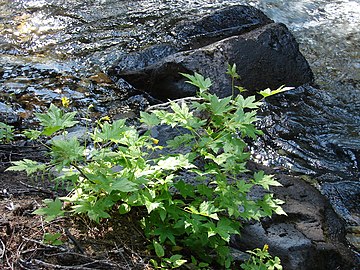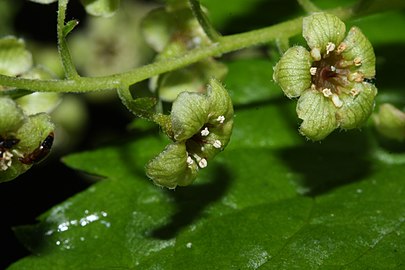
Ribes triste, known as the northern redcurrant, swamp redcurrant, or wild redcurrant, is an Asian and North American shrub in the gooseberry family. It is widespread across Canada and the northern United States, as well as in eastern Asia.

Ribes sanguineum, the flowering currant, redflower currant, red-flowering currant, or red currant is a North American species of flowering plant in the family Grossulariaceae, native to the western United States and Canada.

Ribes malvaceum, the chaparral currant, is a member of the Grossulariaceae. It is native to California and northern Baja California, where it occurs from sea level to 1,500 metres (4,900 ft), in chaparral, foothill oak woodland, and closed-cone pine forest habitats.

The shrub Ribes lacustre is known by the common names prickly currant, black swamp gooseberry, and black gooseberry. It is widely distributed in North America.

Ribes aureum, known by the common names golden currant, clove currant, pruterberry and buffalo currant, is a species of flowering plant in the genus Ribes native to North America.

Alisma lanceolatum is a species of aquatic plant in the water plantain family known by the common names lanceleaf water plantain and narrow-leaved water plantain. It is widespread across Europe, North Africa and temperate Asia. It is naturalized in Australia, New Zealand, Oregon, California and British Columbia. It is considered a noxious weed in some places.
Crepis pleurocarpa is a North American species of flowering plant in the family Asteraceae known by the common name nakedstem hawksbeard. It is native to the western United States (Washington, Oregon, northern California and western Nevada.
Ribes amarum is a species of currant known by the common name bitter gooseberry. It is endemic to California, where it is known from mountains, foothills, and canyons. Its habitat includes Chaparral.
Ribes binominatum is a species of currant known by the common names trailing gooseberry and ground gooseberry.

Ribes californicum, with the common name hillside gooseberry, is a North American species of currant. It is endemic to California, where it can be found throughout many of the California Coast, Transverse, and Peninsular Ranges in local habitat types such as chaparral and woodlands.
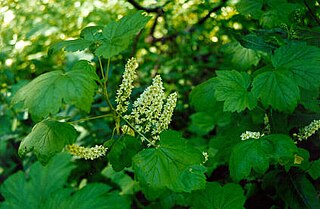
Ribes hudsonianum is a North American species of currant, known by the common name northern black currant.

Ribes inerme is a species of currant known by the common names whitestem gooseberry and white stemmed gooseberry. It is native to western North America from British Columbia to California and westward to the Rocky Mountains. It grows in mountain forests, woodlands, and meadows.
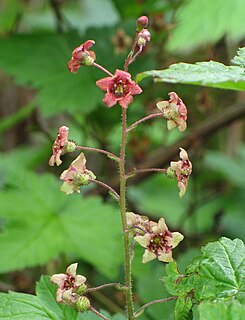
Ribes laxiflorum is a species of currant known by the common names trailing black currant, and spreading currant. It is native to western North America.

Ribes montigenum is a species of currant known by the common names mountain gooseberry, alpine prickly currant, western prickly gooseberry, and gooseberry currant. It is native to western North America from Washington south to California and east as far as the Rocky Mountains, where it grows in high mountain habitat types in subalpine and alpine climates, such as forests and talus. It is a spreading shrub growing up to 1.5 meters tall, the branching stems covered in prickles and hairs and bearing 1 to 5 sharp spines at intervals.
Ribes nevadense is a species of currant known by the common names Sierra currant and mountain pink currant.

Ribes roezlii is a North American species of currant known by the common name Sierra gooseberry.

Ribes velutinum is a species of currant known by the common name desert gooseberry.

Rubus ulmifolius is a species of wild blackberry known by the English common name elmleaf blackberry or thornless blackberry and the Spanish common name zarzamora. It is native to Europe and North Africa, and has also become naturalized in parts of the United States, Australia, and southern South America.

Ribes americanum is a North American species of flowering plant in the gooseberry family known as wild black currant, American black currant, and eastern black currant. It is widespread in much of Canada and the northern United States.
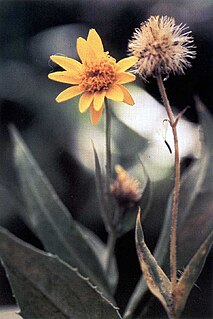
Arnica lanceolata is a North American species of flowering plant in the family Asteraceae, known by the common name clasping arnica or lanceleaf arnica. It has a disjunct (discontinuous) distribution in western North America and northeastern North America.

